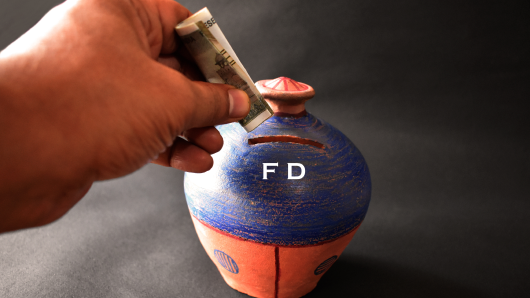Quick Gains: Unveiling Short-Term FD Rate Options
September 10, 2025

Looking for a quick and reliable way to earn higher returns on your savings? You can consider investing in short-term Fixed Deposits (FDs). With attractive interest rates and flexible tenure starting from 7 days, such FDs could help you grow your wealth without parking your funds for too long.
In this blog, we have dissected the concept of short-term FDs and the steps you should take to find the best short-term FD rates to maximise your returns. Let's dive in!
What is Short Term FD?
Short-term deposits generally have a shorter deposit tenure. The interest rates applicable on short-term deposits are higher than regular savings account interest rates, making them a viable option for investors seeking higher returns in a secure way and in a short period of time.
Pro Tip: Invest in short-term FDs only if it's aligned with your investment goals. Consider investing in long-term FDs if you're seeking long-term growth.
Understanding Short-Term FD Rates
Let's talk about how to figure out best short-term FD rates so you can make an informed decision. Generally, small finance banks offer higher FD rates compared to traditional banks. Some FD schemes offer interest rates higher than 7% p.a. for a shorter tenure, especially for senior citizens. Compare different FD products, go through the fine print and invest accordingly.
Making the Most of Short-Term FDs
1. Compare Interest Rates
Short-term FD rates vary from bank to bank. It's important to compare these rates and choose the bank that offers the highest return on your investment.
2. Consider the Tenure
The tenure of a short-term FD can range from 7 days to 12 months. Evaluate your financial goals and choose a tenure that aligns with your needs. For example, if you are saving for a vacation that you are going on six months later, you may consider investing in a short-term FD with a 5-month tenure.
3. Reinvest Your Returns
When your short-term FD matures, consider reinvesting the amount. With this strategy, you can compound your earnings and achieve even higher returns over time.
Factors Influencing Short-Term FD Rates
Certain factors may affect short-term FD rates. Understanding them will help you decide the right investment time and amounts to maximise your income.
Repo Rate Change
Repo rate is the rate at which the central bank (RBI) lends money to commercial banks. Typically, when the repo rate is lowered, FD rates may decrease as banks have cheaper access to funds. Conversely, higher repo rates can lead to higher FD rates subject to terms and conditions as imposed by the bank.
Investor Age
Banks offers higher FD rates to senior citizens. The additional rate varies across banks. For instance, Ujjivan SFB offers additional 0.5% interest rate to senior citizens.
Demand for Credit
Banks’ need for deposits to lend out as loans can affect FD rates. Higher demand for loans can lead banks to offer higher interest rates,
Inflation
Higher inflation typically leads to higher interest rates, including FD rates, as banks try to offer returns that exceed the inflation rate to attract depositors.
Market Liquidity
High liquidity generally leads to lower rates as banks have ample funds, whereas low liquidity can push rates higher.
Final Thoughts
Go for short-term FDs only if you have urgent liquidity needs. Also, always consult a financial adviser before taking any investment decisions to avoid unpleasant surprises. Evaluate your financial goals, compare short-term FD rates and invest accordingly.
Looking to grow your savings? Ujjivan SFB offers a wide range of fixed deposit products. Select the FD of your choice and take a step forward to your financial goals. Alternatively, you can browse through Ujjivan SFB product suite - our wide range of financial products are designed to make your financial life better.
FAQs
1. How do I choose the best short-term FD rate?
To choose the best short-term FD rate, compare different. Also, look for additional benefits like higher interest rates for senior citizens.
2. How does the tenure affect short-term FD rates?
Interest rates vary depending on the tenure of your deposit. Staying invested for the long term would help you earn better returns, thanks to the compounding effect.
3. What is the shortest period for FD?
The shortest period for FD is 7 days.
4. What is the minimum amount required to invest in a short-term FD?
The minimum amount can vary from bank to bank. However, generally the minimum investment amount is ₹1,000. This may go up if you're looking for premium FD products.
5. Can Tax-Saver FDs be considered as short-term FDs?
Tax-Saver FDs come with a lock-in period of 5 years and offers tax exemption up to ₹1.5 lakh under Section 80C of the Income Tax Act, 1961. However, the purpose of such FDs is entirely different and shouldn't be clubbed in the short-term FD category.
Latest Blogs

How to Link PAN with Aadhaar: Step-by-Step Guide & Consequences of Not Linking
Linking your Permanent Account Number (PAN) with your Aadhaar is no longer just a best practice.

Annual Information Statement (AIS): A Complete Guide for Stress-Free ITR Filing
India’s tax season is in its final stretch.

ITR-1 (Sahaj) Restrictions: Income Sources Not Allowed & Filing Rules
With just a few days left before the 15 September 2025 deadline for filing Income Tax Returns (ITRs) for Assessment Year (AY) 2025-26, many taxpayers are rushing to submit their forms online.

GST Rate Cut on Electronics: What It Means for Consumers and Retailers
India’s Goods and Services Tax (GST) system has entered a new era with the rollout of GST 2.0, effective from September 22, 2025.

Banking Safety Guide: How to Avoid QR Code Frauds While Making Payments
India’s love for QR code payments has made transactions lightning-fast, but also opened a new front for cybercriminals.





